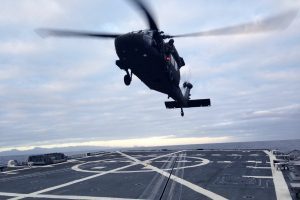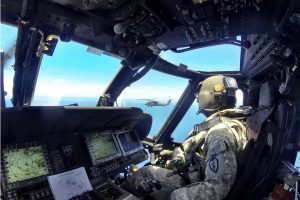News & Stories
A pilot’s perspective: Reaching new heights in business school

Photo courtesy: Matthew Leitch (MBA ’18)
What do flying and finance have in common?
On the surface, it doesn’t seem like much – but I have found several parallels between my experience as a U.S. Army Black Hawk pilot and my business school experience.
Here are a few of the lessons I’ve learned thus far.
Ask great questions.
Imagine yourself in a cramped cockpit, decked out in body armor and trying to fly a 20,000-pound aircraft to the top of a mountain while staring through night vision goggles that give you a 40-degree field of view. You have to land the aircraft on one wheel in order to let a sniper team take a position on the peak of the mountain. There are eight other aircraft in the area that are also under your command, so you’re listening to five different radios simultaneously while navigating to your landing zone.
As you approach, you hear that the target has changed. Your whole plan is now rendered useless. You’ve been assigned a different objective and need to formulate a new plan immediately. It’s up to you to determine how to accomplish your new mission – and with limited information. In that moment, you really wish there was a class on how to ask effective questions.
As leaders, the ability to communicate effectively is crucial. Whether you’re a military leader trying to absorb information about a new mission or a business professional evaluating how the capital markets are trending, the ability to ask great questions demonstrates active listening skills and fosters valuable dialogue – yet it’s something few of us are ever taught.
In business school, students who ask the best questions are often seen as the most engaged and intelligent – especially when they can succinctly encapsulate a concept that helps the whole class understand it on a deeper level. I have been extremely impressed with my peers at UNC Kenan-Flagler. We all come from different professional backgrounds that have shaped our perspectives and approaches to leadership and problem-solving. This diversity of thought has helped me broaden my perspective while also contributing unique insights based on my experiences in the Army. The collaborative culture embedded at UNC Kenan-Flagler reinforces why I chose the school and enjoy it so much.
The process is everything.
Checklists are incredibly important for aviators. When experienced pilots – myself included – get complacent and try to complete their checklist from memory, something inevitably gets messed up.
When I was learning to fly, starting up the helicopter took me more than 45 minutes. Once I got familiar with the checklist, it took me less than 10 minutes. In the same vein, I have made an effort to establish a checklist and routine as a business school student. Doing so allows me to accomplish every task in an efficient and effective manner. Having a set routine cuts down on the time it takes me to get organized and helps ease my mind, as I know I’m not forgetting anything.
Use your mental energy wisely.
I am not going to mince words. The first few months of business school can be an absolutely soul-crushing experience if you’re mentally unprepared. I can distinctly remember the last time I felt so mentally drained: when I was learning how to hover.
Learning to hover requires coordination. Pilots must use both hands – moving independently in three axes – to control the rotor that’s spinning at 500RPM and attached to a fuselage weighing 14,000 pounds. At the same time, you’re hitting the pedals with your feet while talking on the radio and trying to understand your instructor’s feedback.
After just a few hours of flight training, I was so mentally exhausted that accomplishing anything else during the day seemed impossible. Business school can have a similar effect. As a first-year MBA, your brain struggles to create new neural pathways. But eventually, you get into a routine and adjust.
The best thing you can do as a first-year is to understand that this process will not happen overnight. Getting frustrated is a waste of precious mental energy that you will need to power through. I found that focusing on incremental improvements and visualizing success allows me to accomplish the task at hand rather than wasting time and energy on frustration.

Former U.S. Army Black Hawk pilot Matthew Leitch (MBA ’18)
Take a 10,000 foot view.
Military helicopter pilots have a unique perspective of the battlefield. Because helicopters usually fly much lower and slower than planes, pilots can pick up on details that others can’t. This vantage point is a valuable asset that encompasses several elements of an operation into a succinct communication that captures the total picture, allowing troops on the ground make better decisions.
As a business school student, taking a 10,000-foot view helps put everything in perspective and allows me to remain engaged in the learning process while capitalizing on the many opportunities available –even when the workload seems completely overwhelming. This mindset also helps me understand my priorities and determine how to invest my time between competing interests.
Slow is smooth, smooth is fast.
This military saying rings true in many facets of life. Rushing through things usually leads to mistakes – fixing those mistakes will ultimately take more time than if you’d taken a slow and methodical approach in the first place.
Whether you’re a military pilot or a student, you’re often pressed for time and feel rushed throughout the day. When I was flying, I was often part of a quick reaction team that could respond to any mission within 15 minutes of notification. When there is a combat emergency that requires a helicopter, the pilot always has a sense of urgency to respond as quickly as possible. However, I found that it was in everyone’s best interest to avoid confusing this sense of urgency with the need to rush. When rushed, I was prone to overlooking critical pieces of information or making small mistakes that piled up. Taking the “slow is smooth, smooth is fast” approach allowed me to regain mental clarity and utilize my critical thinking skills, even in the most intense situations.
The same approach applies to business school. With so many things happening on campus, I’ve found that taking a methodical and intentional approach is extremely helpful – especially when it comes to recruiting. Doing so has allowed me to organize and optimize my job search. It’s also helped me focus on learning and understanding difficult concepts in class and ultimately created more free time for me to review and study the material on my own.
Relationships are fundamental to leadership success.
Relationship management is key – no matter what business you are in. Having served alongside and led my fellow soldiers, I have a great respect for the power of relationships. As a pilot, managing relationships with your crew – as well as with your maintainers on the ground, the soldiers you support and your chain of command – can be overwhelming at points. But it’s essential.
Successful operations are the result of good relationships. The ability to advocate for yourself and your team and effectively communicate the value you bring to the table are skills that translate perfectly to the business world – and that’s one of the reasons I’m so excited to make this career change.
UNC Kenan-Flagler’s culture fosters relationship development and demands student engagement in the academic experience. I’m incredibly grateful to be at a school that emphasizes the interpersonal aspect of business in such a comprehensive way because I know it will serve me and my peers well in the future. The UNC Kenan-Flagler brand is synonymous with leadership in the business world, and I’m excited to do my part to continue this tradition and contribute to our world-class reputation.
My transition from the military has been full of highs and lows, but I’ve tried to take a learning attitude throughout. One of the best things about making such a dramatic career change is the ability to clearly see how the leadership skills I developed in the Army apply to my future business career and how the lessons I learned will allow me to take my leadership skills from the battlefield to the boardroom.
By Matthew Leitch (MBA ’18)